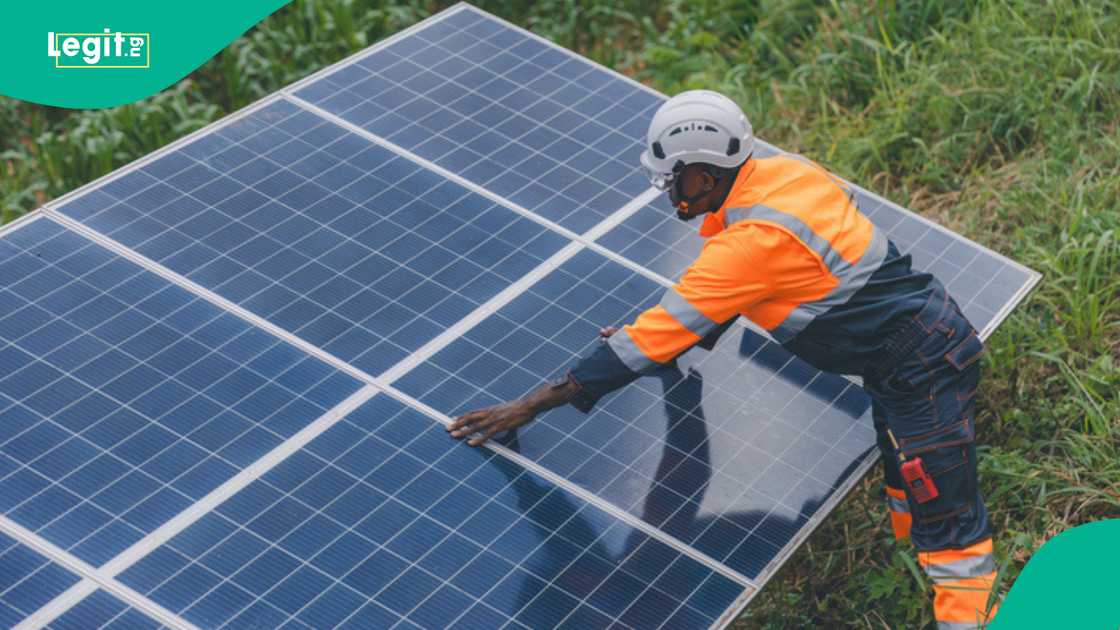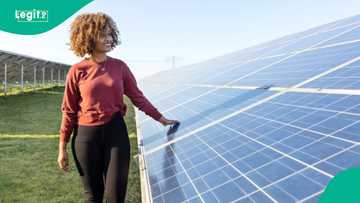PwC Warns Against Immediate Solar Panel Import Ban, Urges Phased Strategy
- PwC has urged the Federal Government to avoid an immediate ban on solar panel imports, warning it could harm energy access and investor confidence
- The firm recommends a phased restriction over three to five years, allowing local manufacturers time to scale up while maintaining supply and affordability
- It also highlights underutilised incentives and calls for streamlined processes and dedicated zones to boost Nigeria’s renewable energy industry
Legit.ng journalist Zainab Iwayemi has 5-year-experience covering the Economy, Technology, and Capital Market.
A recent report by the international consulting firm PricewaterhouseCoopers has advised that the Federal Government should not immediately impose restrictions on the import of solar panels because doing so could jeopardise Nigeria's tenuous gains in energy access and erode investor confidence in the renewable energy industry.

Source: Getty Images
The report was titled "Rethinking Nigeria's Proposed Solar Panel Import Policy., The Punch reported.
It stated that although the drive for local production and industrialisation is admirable, a methodical and staged approach is required to prevent unforeseen consequences.

Read also
Soaring prices push Nigerians to ditch 'Tokunbo' cars for local alternatives, new rates emerge
These suggestions were made in reaction to the government's declaration that imports of solar panels would be prohibited due to the flood of inferior goods.
What report says
A policy to limit imports of solar panels was put forward by the Federal Government through the Ministry of Science and Technology to localise production, save money, and generate employment.
However, PwC stated that the plan runs the danger of slowing Nigeria's clean energy progress if it is not properly planned. Nigeria imported solar panels worth about N237.3 billion in Q4 2024, but by Q1 2025, imports had decreased by roughly 47% to N125.29 billion.
“In 2023 alone, Nigeria imported over four million solar panels, valued at more than $200m. This is not just a reflection of our energy crisis, but also of the absence of adequate local manufacturing capacity,” the report said.
Solution
Instead of imposing a complete ban, PwC suggested that the government reduce imports gradually over a period of three to five years. This would allow local producers to increase their production capacity, meet demand, and set up quality control mechanisms.
“The proposed import restriction policy reflects Nigeria’s ambition for energy security and industrial growth. A measured and strategic approach is needed to avoid unintended disruptions.
A tiered strategy that includes import quotas, progressive tariffs, or blended procurement models would ensure supply continuity while attracting long-term investments under a stable regulatory framework,” the report recommended.
It added,
“The goal should be to scale local manufacturing without compromising access to affordable solar energy. Rather than an instant restriction, Nigeria should adopt a three to five-year phased reduction in solar panel imports.”
The company recognised that the Nigerian government already provides incentives including VAT exemptions, import tax waivers, the Pioneer Status Incentive and green finance instruments.
But because of bureaucratic red tape, disjointed application procedures, and low awareness, these are still terribly underutilised.
“There is an urgent need for single-window applications, clearer eligibility criteria, and renewable energy desks in key MDAs,” PwC stated. It also called for dedicated renewable energy industrial zones, equipped with shared infrastructure, streamlined permit processes, and proximity to ports and transport corridors to reduce logistics costs.

Source: Getty Images
Nigeria's solar panel importation declines
Legit.ng reported that in the first quarter of 2025, Nigeria saw an 89% decrease in the importation of solar panels.
Data from the National Bureau of Statistics (NBS) Q1 2025 Foreign Trade Statistics shows that the country imported N125.294 billion worth of solar panels, also known as "photovoltaic cells assembled in modules or made up into panels," which is less than the N237.309 billion imported in the final quarter of 2024.
This comes as Abba Aliyu, the Managing Director/CEO of the Rural Electrification Agency (REA), recently claimed that Nigeria can currently produce 600 megawatts of PV panels.
Source: Legit.ng




